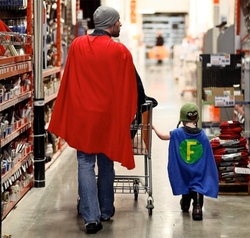
For example, when it comes to easing symptoms of anxiety-related disorders, prayer doesn’t have the same effect for everybody. Baylor University researchers found that what seemed to matter more was the type of attachment the praying individual felt toward God.
Those who prayed to a loving and supportive God whom they thought would be there to comfort and protect them in times of need were less likely to show symptoms of anxiety-related disorders — symptoms such as irrational worry, fear, self-consciousness, dread in social situations, and obsessive-compulsive behavior — than those who prayed but did not expect God to comfort or protect them.
The study is published in the journal Sociology of Religion.
“While previous research has shown that people who have a secure attachment to God are more satisfied with life and less depressed and lonely, little attention has been paid to psychiatric symptoms,” said researcher Matt Bradshaw, Ph.D.
“For many individuals, God is a major source of comfort and strength that makes the world seem less threatening and dangerous. Through prayer, individuals seek to develop an intimate relationship with God,” Bradshaw said.
“Those who achieve this goal, and believe that God will be there to protect and support them during times of need, develop a secure attachment to God.”
In this context, prayer appears to confer emotional comfort, which results in fewer symptoms of anxiety-related disorders.
“Other people, however, form avoidant or insecure attachments to God — meaning that they do not necessarily believe God will be there when they need Him,” he said.
“For these individuals, prayer may feel like an unsuccessful attempt to cultivate and maintain an intimate relationship with God. Rejected, unanswered, or otherwise unsuccessful experiences of prayer may be disturbing and debilitating — and may therefore lead to more frequent and severe symptoms of anxiety-related disorders.”
For the study, researchers analyzed data from 1,714 of the individuals who participated in the 2010 Baylor Religion Survey. The study focused on general anxiety, social anxiety, obsession, and compulsion.
Teachings of Christianity and some other faiths use the parent-child imagery to depict the relationship between God and an individual, with one researcher describing God as “the ultimate attachment figure.”
The Baylor study findings are consistent with a growing body of research indicating that a person’s perceived relationship with God can play an important role in shaping mental health.
In theory, people who pray regularly may be inclined to live out their religion more faithfully, which may lead to less stress, such as marriage and family conflicts, researchers wrote.
People who pray often may have more of a sense of purpose in life or have more supportive personal relations. And many people use prayer as a coping strategy.
When it comes to personal prayer outside of religious organizations, however, findings by previous researchers have been inconsistent — and puzzling.
Some studies indicate frequent praying has positive effects on mental health; others report no effect — or even that people who pray more often have poorer mental health than those who pray less frequently.
“At the present, we don’t know exactly why the findings have been so inconsistent,” Bradshaw said. “Prayer is complex.”
Some possible explanations for varying findings:
- Individual expectations – Some scholars suggest that “if you expect prayer to matter, it just might,” Bradshaw said. In several studies of older adults, people who believe that only God knows when and how to respond to prayer fare well when it comes to mental health; those who think their prayers are not being answered do not.
- Style of prayer — In general, meditative and colloquial prayers have been linked with desirable outcomes, including emotional well-being, while ritualistic prayer actually has been associated with poor mental health outcomes.
- Perceived characteristics of God — such as loving, remote, or judgmental — affect the relationship between prayer and mental health. “Our previous work has found that prayer is associated with desirable mental health outcomes among individuals who believe that they are praying to a God who is close as opposed to remote, and the results from the current study are largely consistent with this finding,” Bradshaw said.
- Differences in study design and sampling.
“These are all important considerations, but a comprehensive understanding of the connection between prayer and mental health remains elusive,” he said. “We still have a lot of work to do in this area.”
This research is from Baylor University. This summary of the study can be found here: http://psychcentral.com/news/2014/08/14/how-you-think-of-god-impacts-prayers-effect-on-mental-health/73602.html









 RSS Feed
RSS Feed